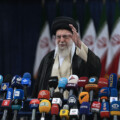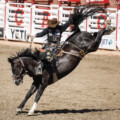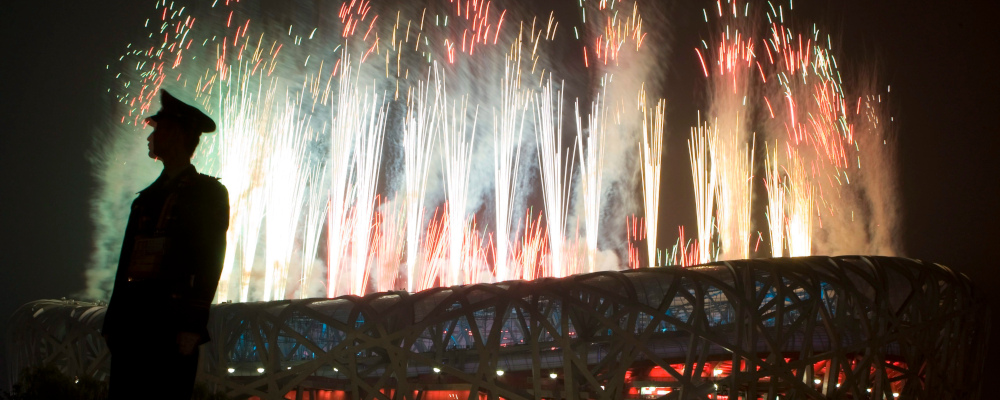A standard critique of the 2022 Winter Olympics in Beijing is that the games signal tacit approval of the Communist Party’s human rights abuses, effectively legitimizing what some have described as acts of genocide. Yet the Olympics do not merely provide a gloss on human rights abuses; they intensify them. When China hosts international events, its domestic security agencies launch pre-emptive strikes against anti-regime dissidents and members of religious minorities.
In 2008, Jia Yahui was an advertising account executive for a television news station in Shenyang, China. Shortly before the 2008 Beijing Olympics, she was taken into custody as part of a nationwide crackdown and sentenced without trial to one year in a reeducation-through-labour camp. In 2010, soon after her release from the labour camp, Yahui fled to the United States where she was granted asylum.
The following interview was originally conducted as background research for the 2018 documentary film Letter from Masanjia. It has been translated and edited for length and clarity.
CAYLAN FORD: When did you learn that Beijing would host the 2008 Summer Olympic Games?
JIA YAHUI: It was 2001. My child was very young at the time, and she had fallen asleep while my husband and I watched the news on the TV. When we saw the announcement that Beijing had won the bid to host the Olympic Games, we were so excited, so proud of China. We celebrated with firecrackers in the street that night.
I never could have expected that, when the Olympics finally arrived seven years later, I would be in a forced labour camp.
It’s possible that the international community thought that by letting China host the Olympics, it would encourage the Communist Party to improve their performance on human rights issues. But it turned out the opposite: the Olympics were used as a pretext for intensifying the persecution of China’s citizens.
CAYLAN FORD: What were the circumstances of your arrest and imprisonment?
JIA YAHUI: In October of 2007, I went to visit my family in the United States for about two weeks. My mother had previously been imprisoned for her faith, so she fled China to Thailand, and then to the U.S., where she was granted asylum. By 2007, most of my family had moved to the U.S.
The Summer Olympics were to be held in August 2008. A few months before the games arrived, on 15 April 2008, I was withdrawing some cash from my bank. When I walked out of the bank, I felt someone grab my arms suddenly. My first thought was that I was being robbed; robberies are common outside of banks. There were two men, both very tall and muscular, each holding one of my arms.
One of them shouted, “Don’t move! National security agency!” The other one took the handbag and keys out of my hands. Then a black car sped up to the curb, and before I could understand what was happening, they forced me into the car and drove away.
They used something to cover my head so I couldn’t see where we were going. I was taken to a building that looked like a regular house. It had a living room and kitchen. But in the middle of the house was an interrogation room.
I was kept there for 22 days. Every day, starting at 11 o’clock at night, the interrogations began. Every day they asked the same questions: “Who did you contact when you were in the U.S.? What tasks were you assigned to do in China? Why did you return to China?” It was ridiculous. I told them I had been in the U.S. on vacation visiting my family. China is my home. I live here. I have a job here. Why can’t I come home after my vacation?”
The nightly interrogations went on for weeks, and the questions never changed. Finally, they threatened me: “If you want to get out of here in one piece, you’ll have to cooperate.” They told me that I would be released if I agreed to spy on my family members overseas. My family overseas all practice Falun Dafa, so they wanted to use me as a secret informant. I told them, “This isn’t funny. Do I look like a traitor to you? If I did what you suggest, I would not be worthy of being called a human being.”
Eventually they gave up questioning me. On 4 June 2008, they sent me to Masanjia reeducation-through-labour camp. There was no trial, no criminal charges, and no possibility of appeal.
CAYLAN FORD: You mentioned that the Olympics led to an intensification of human rights abuses. Why was that?
JIA YAHUI: As it was explained to me, the authorities were afraid that I had connections to foreigners. They worried that I might be in touch with some foreign journalists, and they were especially paranoid during the Olympics about stories that could cause embarrassment to the Communist Party’s regime. So they rounded up thousands of Falun Dafa practitioners across the country, and other people who they thought might try to speak out or stage demonstrations during the Olympic games.
CAYLAN FORD: Had you heard about Masanjia prior to being sent there?
JIA YAHUI: Yes, of course. Everyone knew about Masanjia. It was a model camp for “transforming” people. I knew something about the brutality of the torture methods used there. There was a rumour about the sexual abuse too: that they threw women into jail cells with male criminal inmates to be raped.
But I was a bit skeptical, to be honest. The stories all seemed so implausible, so far removed from my regular life. I lived in Shenyang, a city not far away from Masanjia. How could such a different world co-exist in such close proximity to my own? But that was before I experienced it for myself.
CAYLAN FORD: What happened when you arrived at the labour camp?
JIA YAHUI: There were three units in the women’s section of the camp. The first two were for petty criminals, drug addicts, prostitutes, petitioners. The third section, much bigger than the others, was where the Falun Dafa detainees were held. We made up about 80 percent of the labour camp’s population.
First I was taken to the office of the chief warden. When she came into the office, she shouted at me: “Attention! Stand straight!” I had a hard time processing why I was being treated as a criminal. She kept shouting orders at me, telling me I would have to follow the rules. Then they took my clothes, put me in a prison uniform, and cut my hair short.
Then the transformation process began.
CAYLAN FORD: What is transformation?
JIA YAHUI: They try to make you renounce your faith, renounce your beliefs. They call it “transformation.” It’s a kind of brainwashing or forcible conversion.
CAYLAN FORD: How did they try to transform you?
JIA YAHUI: The first step is ideological work. They try to confuse and persuade you, using all sorts of twisted logic to make you give up your beliefs. And when they see that you are unmoved by their arguments, they hand you over to the police.
I was taken to a dark storage room and locked in there with several other detainees. There was very poor air circulation, it was crawling with bugs, and we slept cramped on old straw mats on the floor. We were under strict supervision: we weren’t even allowed to use a bathroom without the guard’s permission. We weren’t given any feminine sanitary products either. They do this to destroy your morale and your sense of dignity.
After about a month, they transferred me to a “strict management unit.” They had us run drills every day in the yard. Many of the women had already been tortured quite badly and had become weak from prolonged detention. If they couldn’t keep up, the guards would use electric batons to shock them.
That was just the beginning. It grew progressively more intense, starting just before the Beijing Olympics began.
CAYLAN FORD: What happened during the Olympics?
JIA YAHUI: Every day we had to sing songs together glorifying the Communist Party. If you refused, you would be shocked with the electric baton. During the Olympic Games, they told us to sing the theme song “Beijing Welcomes You.” We refused. The guards asked, “Are you not proud that China is hosting the Olympic Games? Are you not patriotic?” But how could we feel proud? We were imprisoned illegally because of these Olympics.
The police surrounded us, each of them carrying an electric baton. There was one woman from Beijing, Wang Lixin, who they singled out first. She refused to sing, so a male police officer slammed her to the ground. He beat her with his fists, kicked her, and stomped on her face and chest. When it was over, she spit out some teeth.
Next they asked a 60-something woman from Dalian city, named Li Yurong. They commanded her to sing, but she just stood there, silent. The guards shocked her with the electric batons, and she was convulsing on the ground. She continued shaking for some time thereafter, and her face had gone pale, but still she refused to sing.
Eventually it was my turn. When they asked me to sing, I challenged them: “‘Beijing Welcomes You’? Who does Beijing welcome? Not us.” About 50 of the women in my section of the labour camp, all Falun Dafa adherents, had been arrested and sent to Masanjia as part of an “Olympic security” operation. I said “The Olympic Games are about fostering peace among people of diverse creeds and nationalities. Why don’t you put away your electric batons for a while and give us some peace?” The guards exchanged looks, but they didn’t say anything.
Later that day, the captain of the guards took me to his office. I don’t even remember what it looked like inside, because almost immediately he set upon me, attacking with his fists, landing blow upon blow on my face, my body. I felt blood running out of my mouth.
CAYLAN FORD: Did they ever use the electric baton on you?
JIA YAHUI: A few weeks after that incident, the chief guard announced that it was “Jia Yahui day.” He said he was going to teach me a lesson, and took me to the East Wing of the camp.
The East Wing had been a mystery up to that point. There weren’t many prisoners there. All the windows were boarded up, and you couldn’t see inside the rooms. But I had often heard the sounds of beatings and screams emanating from that building.
They took me to a room on the second floor and handcuffed me to the metal frame of a bunk bed. My legs were tied to the bottom portion of the bed, my body was bent forward, and arms stretched and tied to the upper portion on the opposing side of the frame. It’s hard to describe the pain of being stretched and suspended in this position—it tested the limits of the human capacity to forbear.
Then, while I was still tied up in that stress position, they started shocking me with the electric batons. They would target sensitive areas, like the inner thighs and the waist. My skin started blistering wherever they shocked me; the blisters reminded me of the time I accidentally touched a lit cigarette butt as a child. To this day, the scars have not healed. I could feel the current pulsing through my entire body, coursing through my nerves. I was shaking uncontrollably. The guards would keep shocking me in the same place for 10 or 20 minutes at a time. It lasted for several hours.
Before this, I had often heard screams of pain from the East Wing. I thought to myself: if they torture me, I can endure it. I won’t cry out or scream, because I don’t want the other detainees to feel afraid. So when they shocked me for the first time, I clenched my teeth together and tried not to make a sound. I was sweating intensely. But after a few minutes, the pain was just too unbearable. A primal scream exploded out of me, so loud that even the guard started shaking as he held the baton.
I could tell that some of the guards were nervous. I was from Shenyang City, and they lived in Shenyang too. One of them asked me to wear a blindfold, so that when I got out of the labour camp, I would not be able to identify them. He said, “Maybe one day we will exchange positions, and we’ll be the ones being tortured.” They knew what they were doing was wrong.
CAYLAN FORD: Was that the worst torture you experienced?
JIA YAHUI: There was another torture method I experienced personally, called the “big hang.” They used this method as punishment after the prisoner uprising.
There was an elderly woman from Beijing named Qiu Shujin. On 11 September 2008, she stood up during lunch hour in the canteen and exclaimed “Falun Dafa is good! ‘Truth, Compassion, and Tolerance’ are good! These people are innocent!” She said that the good will be rewarded, and evil deeds will meet with evil returns in the future.
Everyone in the canteen fell silent. We just looked on, frozen, as the police rushed over to her. They grabbed her tiny body and dragged her away. I was worried for her—how much torture would she have to endure for this? For how many days would they tie her up? But then, to my relief, she came back later that afternoon. I figured the guards had gone easy because she was an old woman.
My relief was short-lived, though, because that evening she started experiencing a very severe headache and was vomiting. It turned out that her skull had been cracked earlier in the day when the guards tackled her. She was taken away that night, and we never saw her again. We didn’t know whether she was dead or alive.
We all felt that we had to do something. So the next day, during lunch in the canteen, half the women in our unit—about 20-30 of us—all stood up and exclaimed “Stop the persecution! We will not be transformed, we are innocent!”
This incident was a shock to the guards. Investigators were dispatched to Masanjia to determine how this had been allowed to happen. In the end, the guards said that I had been among the lead instigators, along with three other women.
The four of us were sent for the “big hang.” There are several kinds of stress positions they use at Masanjia: sometimes they stretch your body on a rack, or tie you up the frame of a bunk bed, bent over and suspended from the wrists. Another style was where they hang you upside-down, causing you to lose consciousness. The other kind is where they handcuff your wrists and ankles to the top of the bunk bed, and your whole body is stretched and suspended in the air.
They hung me like that for 12 hours. Every second and every minute felt like an eternity. I don’t have the words to explain what it was like. It’s like being torn limb from limb. By the time they let me down, I had no will left, no determination. My extremities had changed colour. I couldn’t even think, as I was sapped of all energy. I had to be dragged back to my cell. It was the same for all the women. It took a long time before we could walk normally again, and the guards made a show of dragging us everywhere as a warning to the other detainees.
CAYLAN FORD: What was the purpose of the torture?
JIA YAHUI: It was to transform you. Every month, they write an assessment of each prisoner’s conduct. If you refused to be transformed, and if you held fast to your convictions, then you had to remain in the labour cap until the end of your sentence. If you agreed to be transformed and signed a statement of repentance for your beliefs, then you would be released early. The goal is to make you lie. They want to force you to betray your conscience.
Recommended for You

Michael Bonner: Are we witnessing the last gasp of Iran’s Islamic Republic?

Need to Know: Yahoo, Alberta! You’re doing something right

Need to Know: Mark Carney’s digital services tax disaster

Kirk LaPointe: B.C.’s ferry fiasco is a perfectly Canadian controversy



